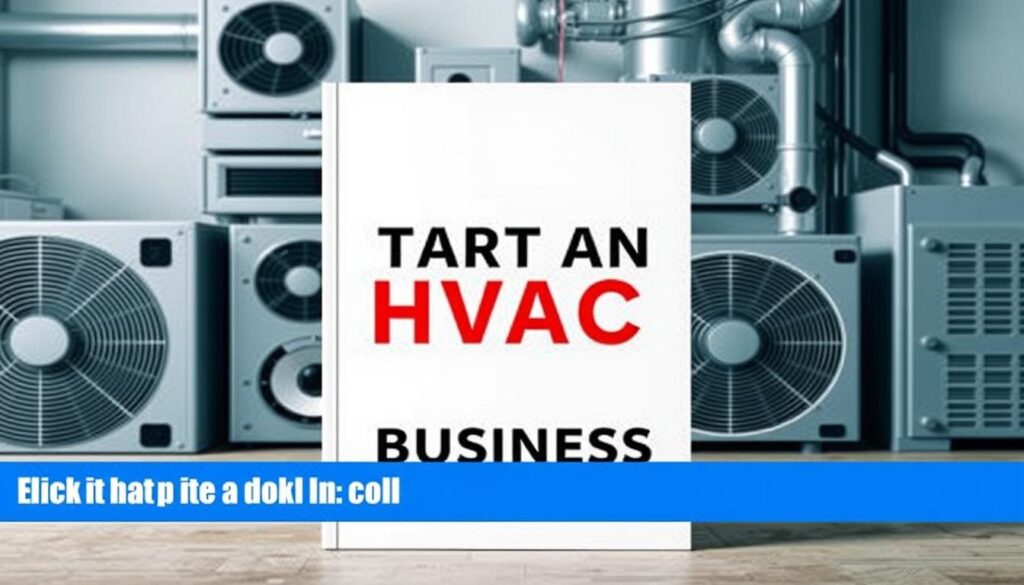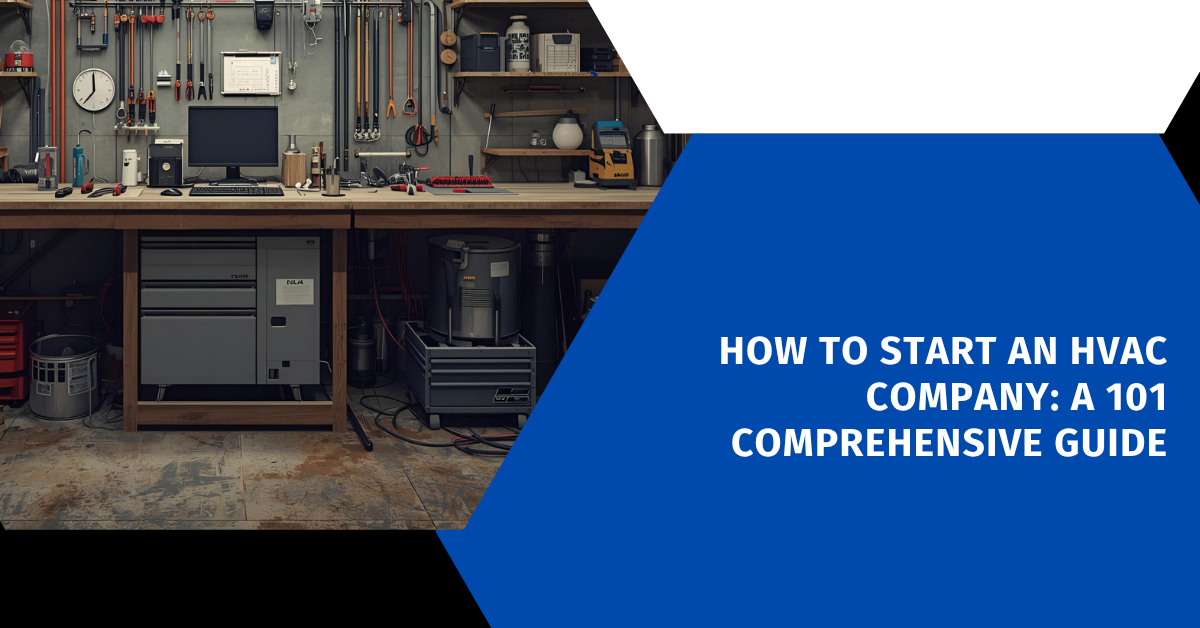Affiliate Disclosure
HVAC Guide Guys is a participant in the Amazon Services LLC Associates Program, an affiliate advertising program designed to provide a means for sites to earn advertising fees by advertising and linking to Amazon.
How to Start an HVAC Company? Are you ready to turn your technical skills into a booming HVAC business? The heating, ventilation, and air conditioning field is a great chance for skilled people to start a successful business. It’s a growing market that’s full of opportunities.

The global HVAC market is growing fast. It’s expected to jump from $281.7 billion in 2024 to $389.9 billion by 2029. This growth is a big chance for those wanting to start an HVAC company and succeed in this field.
To start an HVAC business, you need a good plan, technical know-how, and a deep understanding of the market. As more people look for energy-saving and advanced cooling and heating, there’s a lot of money to be made in this industry.
Key Takeaways
- HVAC industry offers significant growth potential
- Technical skills are crucial for business success
- Market projections indicate increasing demand
- Comprehensive planning is essential
- Entrepreneurial mindset drives HVAC business growth
Table of Contents
Understanding the HVAC Industry Landscape
The HVAC industry is changing fast, offering great chances for new businesses. With new tech and changing what people want, knowing the market is key to success.
Important trends in the HVAC world include:
- Growing demand for energy-efficient systems
- Increasing integration of smart home technologies
- Expanding focus on sustainable and green solutions
- Rising importance of digital service platforms
When starting an HVAC business, it’s important to understand the industry’s fast pace. Smart business owners keep up with new rules and tech. Your ability to adapt will affect your business’s success.
For a profitable HVAC business, knowing your market is crucial. Residential and commercial markets have different chances. Focusing on areas like energy-efficient systems or smart home tech can make you unique.
The most successful HVAC businesses view technological change as an opportunity, not a challenge.
The market favors businesses that:
- Keep learning about new tech
- Put customers first
- Use creative marketing
- Offer green solutions
Your edge will come from being ahead of trends and offering top-notch, advanced solutions.
Essential Qualifications and Certifications
Starting an HVAC company is more than just knowing how to fix things. You must also understand the rules for education, certifications, and licenses. These rules change from state to state.
Required Education and Training
First, you need a good education. A high school diploma is the basic start. But, most HVAC pros get more training through:
- Technical trade schools
- Community college programs
- Apprenticeship programs
- Vocational training courses
Licensing Requirements
Licensing is key to legally running your business. Each state has its own rules. But, most require:
- Passing a big licensing exam
- Showing you have enough work experience
- Having liability insurance
- Passing a background check
Professional Accreditations
Getting certified can boost your career. Look into:
- EPA Section 608 Certification for refrigerants
- North American Technician Excellence (NATE) certification
- HVAC Excellence Professional-level credentials
Keep learning and stay current with industry trends. This will help your HVAC business stand out.
How to Start an HVAC Company: Initial Steps
Starting an HVAC business needs careful planning and preparation. Your starting hvac business plan is your guide to success. It helps you through the first steps of setting up your company.
Before you start in the HVAC industry, do thorough market research. Knowing your local market helps you see what customers need and who you’re up against. This research will help you decide on your business’s direction and what services to offer.
- Analyze local HVAC service demand
- Identify target customer segments
- Research local competition
- Evaluate potential service areas
The costs to start your HVAC business vary. You’ll need to spend on:
- Professional licensing and certifications
- Vehicle purchases or leasing
- Initial equipment investment
- Insurance and legal documents
“Success in the HVAC industry begins with meticulous planning and a clear understanding of your business foundation.” – HVAC Industry Expert
When picking a business name, choose something that stands out and shows your commitment to quality HVAC services. Make sure it’s unique and can be registered in your state.
Don’t forget to get the right permits and insurance. These legal steps protect your business and build trust with customers. They’re crucial in the competitive HVAC market.
Creating Your HVAC Business Plan
Creating a solid business plan is key to your success in the HVAC field. Your plan is like a roadmap, guiding your company through ups and downs in the heating and cooling world.
A good HVAC entrepreneur guide stresses the need for a detailed plan. This plan should cover all important parts of your business.
Key Business Plan Components
Your plan should have a few main parts:
- Executive summary that shows your business vision
- Detailed market analysis
- Competitive landscape assessment
- Service pricing strategy
- Marketing and growth projections
Operational Planning Essentials
Operational planning turns your ideas into real steps. Focus on:
- Workflow optimization
- Equipment procurement strategies
- Inventory management systems
- Staffing requirements
- Customer service protocols
Take the time to make a detailed business plan. It should attract investors and give your HVAC business a clear direction.
Explore Our HVAC Shop
Looking for top-rated HVAC tools, parts, and accessories? Visit our shop and find the perfect solution for your needs.
Visit the ShopFinancial Requirements and Startup Costs
Starting an HVAC business needs careful financial planning. You must understand the startup costs. Your initial investment can vary a lot, from $2,000 to $100,000. This depends on your business size and strategy.
When figuring out hvac business startup costs, consider several key areas:
- Equipment and professional tools
- Work vehicles
- Initial inventory
- Licensing and permits
- Insurance coverage
- Marketing and advertising
There are many ways to finance an hvac business. You can use:
- Personal savings
- Small business loans
- Equipment financing
- Small business grants
- Angel investors
To handle startup expenses well, make a detailed budget. Look for ways to save money. Think about buying used equipment, leasing vehicles, and smart marketing.
| Expense Category | Estimated Cost Range |
|---|---|
| Professional Tools | $5,000 – $20,000 |
| Work Vehicle | $15,000 – $50,000 |
| Initial Inventory | $3,000 – $15,000 |
| Licensing and Insurance | $2,000 – $10,000 |
Good financial planning is key to your HVAC business’s success. Spend time looking into financing options and making a solid financial plan.
Legal Structure and Registration Process

Choosing the right legal structure is key when starting an HVAC service company. It affects taxes and personal liability. So, picking the best option for your business is crucial.
Business Formation Options
When starting your HVAC business, you’ll find several legal structures to choose from:
- Sole Proprietorship: Simplest structure with minimal paperwork
- Partnership: Shared ownership and responsibilities
- Limited Liability Company (LLC): Protects personal assets
- Corporation: Most complex structure with robust legal protection
Documenting Your HVAC Contractor Licensing Requirements
Getting your HVAC contractor license means gathering specific documents. Each state has its own rules. So, it’s important to check your local laws carefully.
| Document Type | Purpose | Typical Processing Time |
|---|---|---|
| Business License | Legal permission to operate | 2-4 weeks |
| Tax ID Number | Federal tax identification | Immediate online |
| State Contractor License | Professional certification | 4-8 weeks |
Talking to a local business attorney can help you follow all the steps correctly and quickly.
“Proper legal structure sets the foundation for your HVAC business success” – Professional Business Advisor
Remember, each structure has different tax rules and legal protections. Think about your specific needs and future goals when making this choice.
Explore Our HVAC Shop
Looking for top-rated HVAC tools, parts, and accessories? Visit our shop and find the perfect solution for your needs.
Visit the ShopEssential Tools and Equipment Selection
Starting an HVAC business means investing in top-notch tools and equipment. Your success hinges on picking the right tools that meet performance and cost needs. High-quality gear ensures great service and keeps startup costs in check.
When creating your toolkit, focus on three main areas:
- Basic Hand Tools
- Safety Equipment
- Advanced Diagnostic Instruments
Choosing the right tools is key to a profitable HVAC business. Look for durable, high-quality equipment that offers lasting value. Brands like Klein Tools, Fluke, and Yellow Jacket are trusted by HVAC pros.
| Tool Category | Essential Items | Estimated Cost Range |
|---|---|---|
| Hand Tools | Screwdrivers, Wrenches, Pliers | $300 – $800 |
| Safety Equipment | Hard Hat, Safety Glasses, Work Gloves | $200 – $500 |
| Diagnostic Tools | Multimeter, Refrigerant Gauge, Leak Detector | $1,000 – $3,000 |
Pro tip: Think about leasing equipment first to cut down on startup costs. This way, you can use top tools without spending too much upfront.
“Investing in quality tools is investing in your business’s reputation and future success.” – HVAC Industry Expert
Don’t forget about equipment upkeep. Regular checks and proper care make your tools last longer and work better. This helps your HVAC business stay profitable.
Marketing Strategies for HVAC Companies
Creating strong hvac company marketing strategies is key to a successful HVAC business. Your marketing plan can help you find more customers or keep a steady flow of them.
Digital marketing is a cost-effective way to reach out to potential customers. It can greatly increase your visibility and bring in more leads for your HVAC business.
Digital Marketing Tactics
- Search Engine Optimization (SEO) to improve online visibility
- Pay-Per-Click (PPC) advertising for immediate customer reach
- Social media marketing to engage with local customers
- Content marketing through informative blog posts
- Email marketing for customer retention
“Your online presence is your modern-day business card” – Digital Marketing Expert
Traditional Marketing Methods
Even though digital strategies are strong, traditional marketing still works well. Mixing both can give you the best results.
- Direct mail campaigns targeting local homeowners
- Community event sponsorships
- Networking with local real estate professionals
- Print advertisements in local publications
- Vehicle branding for mobile advertising
Pro Tip: Track your marketing efforts to understand which strategies deliver the best return on investment.
Explore Our HVAC Shop
Looking for top-rated HVAC tools, parts, and accessories? Visit our shop and find the perfect solution for your needs.
Visit the ShopPricing Structure and Service Packages

Creating a smart pricing plan is key for a profitable HVAC business. As an HVAC entrepreneur guide, knowing how to price your services is crucial. Your prices should show your expertise, meet market needs, and align with your business goals.
Professional HVAC businesses often use three main pricing methods:
- Hourly Rate Pricing: Charging by the time spent on a job
- Flat Rate Pricing: Set prices for certain services
- Combination Pricing: Mixing labor and materials costs
When setting your pricing strategy, remember these important points:
- Figure out your total overhead costs
- Look at what others in your area charge
- Think about how much profit you want to make
- Check out what your competitors are charging
Service packages can really boost your earnings. Think about offering maintenance plans with set prices and regular service. These plans could include seasonal checks, fast scheduling, and lower repair costs.
Strategic pricing isn’t just about numbers—it’s about showing value to your customers.
Being open is essential. Make sure to explain your pricing clearly, give detailed estimates, and talk about the value of your services. This builds trust and shows why your HVAC services are a good investment.
Building Your HVAC Team
Starting a successful HVAC business is more than just knowing how to fix things. Your team is key to success. Good technicians and customer service can make your business stand out.
To build a strong team, you need to hire well and manage effectively. Let’s look at what makes a top HVAC team.
Hiring the Right Technicians
When you’re looking for team members, keep these tips in mind:
- Make sure they have the right certifications and licenses
- Do thorough background checks
- Test their skills with hands-on tests
- Ask for references from past employers
Effective Team Management Strategies
Managing your team well is crucial for success and happiness.
| Management Strategy | Key Benefits |
|---|---|
| Regular Training Programs | Keeps skills sharp and improves service |
| Performance Incentives | Makes technicians work harder and rewards them |
| Clear Communication Channels | Helps the team work better together |
Investing in your team’s growth is essential for lasting success. Remember, your technicians are the face of your company.
Legal Considerations in Team Management
Follow labor laws and industry rules. This includes:
- Correct worker classifications
- Fair wages
- Safe workplaces
- Equal job opportunities
Being dedicated to a skilled and motivated team will help you stand out in the HVAC market.
Explore Our HVAC Shop
Looking for top-rated HVAC tools, parts, and accessories? Visit our shop and find the perfect solution for your needs.
Visit the ShopManaging Customer Relationships
Building strong customer relationships is key for a successful HVAC service company. Connecting with clients can turn a one-time job into a long-term business. It’s more than just fixing or installing systems.
To grow your HVAC business, try these tips:
- Create a comprehensive communication system
- Develop a structured follow-up protocol
- Invest in customer relationship management (CRM) software
- Train your team in customer service excellence
Your CRM system should track all customer interactions. This includes service history, preferences, and future needs. Proactive communication makes you stand out. Sending regular maintenance reminders and seasonal check-ups shows you care.
Dealing with customer complaints needs a smart plan. Listen well, respond fast, and offer solutions. Having a feedback system shows you value what customers say.
- Respond to all feedback within 24 hours
- Offer service guarantees
- Create loyalty programs
- Develop referral incentive plans
Focus on customer relationships to build a strong HVAC reputation. Exceptional service leads to repeat business and great referrals.
Conclusion
Starting an HVAC company needs hard work, smart planning, and a love for learning. As you start your HVAC business journey, remember success comes from knowing the industry, getting the right qualifications, and having a solid business plan.
The HVAC industry is growing fast, with a 5% increase expected by 2028. Your success will depend on how well you handle challenges, use new technologies, and give top-notch customer service. This guide has given you key tips to turn your dreams into a real business.
Being flexible is key in the changing HVAC world. Keep learning, use new tech, and always put your customers first. Your success will come from offering great services, building strong relationships, and getting better at what you do.
With the knowledge from this guide, you’re ready to start your HVAC business. Your hard work, passion, and smart planning will be the foundation of your success in the HVAC world.
FAQ
How much does it cost to start an HVAC company?
What certifications do I need to start an HVAC business?
How long does it take to start an HVAC company?
Do I need special insurance for an HVAC business?
What is the most challenging aspect of starting an HVAC company?
How profitable is an HVAC business?
How much does it cost to start an HVAC company?
What certifications do I need to start an HVAC business?
How long does it take to start an HVAC company?
Do I need special insurance for an HVAC business?
What is the most challenging aspect of starting an HVAC company?
How profitable is an HVAC business?
FAQ
How much does it cost to start an HVAC company?
Starting an HVAC company can cost between ,000 to 0,000. This depends on things like equipment, vehicles, licenses, insurance, and marketing. You’ll need tools, vehicles, inventory, and money for the first few months.
What certifications do I need to start an HVAC business?
You’ll need several certifications. These include an EPA Section 608 Certification for refrigerants, NATE certification, and state HVAC licenses. Most states also require a journeyman or master HVAC technician license after several years of experience.
How long does it take to start an HVAC company?
Starting an HVAC company takes 6-12 months. This includes getting certifications, making a business plan, finding funding, buying equipment, and registering your business.
Do I need special insurance for an HVAC business?
Yes, you need special insurance. This includes general liability, professional liability, workers’ compensation, and commercial auto insurance. These cover damages, accidents, and business risks.
What is the most challenging aspect of starting an HVAC company?
The biggest challenges are managing startup costs, building a customer base, and competing with others. A strong marketing strategy and great customer service are key to success.
How profitable is an HVAC business?
HVAC businesses can be very profitable. Small to medium-sized companies can make 0,000 to
FAQ
How much does it cost to start an HVAC company?
Starting an HVAC company can cost between $50,000 to $150,000. This depends on things like equipment, vehicles, licenses, insurance, and marketing. You’ll need tools, vehicles, inventory, and money for the first few months.
What certifications do I need to start an HVAC business?
You’ll need several certifications. These include an EPA Section 608 Certification for refrigerants, NATE certification, and state HVAC licenses. Most states also require a journeyman or master HVAC technician license after several years of experience.
How long does it take to start an HVAC company?
Starting an HVAC company takes 6-12 months. This includes getting certifications, making a business plan, finding funding, buying equipment, and registering your business.
Do I need special insurance for an HVAC business?
Yes, you need special insurance. This includes general liability, professional liability, workers’ compensation, and commercial auto insurance. These cover damages, accidents, and business risks.
What is the most challenging aspect of starting an HVAC company?
The biggest challenges are managing startup costs, building a customer base, and competing with others. A strong marketing strategy and great customer service are key to success.
How profitable is an HVAC business?
HVAC businesses can be very profitable. Small to medium-sized companies can make $500,000 to $1.5 million a year. Profit margins are 10% to 20%, depending on your area and efficiency.
What equipment do I need to start an HVAC company?
You’ll need diagnostic tools, hand tools, safety gear, and more. The cost can be $10,000 to $50,000, depending on your services.
How do I market my new HVAC business?
Create a marketing plan with a website, SEO, social media, and ads. Use Google My Business, network, and get customer referrals and reviews.
What legal structure is best for an HVAC company?
Most choose an LLC for personal protection, tax benefits, and easy management. Talk to a local attorney to find the best structure for you.
How many employees should I start with?
Start with 2-4 employees, including yourself and 1-3 technicians. Grow your team as your business expands.
.5 million a year. Profit margins are 10% to 20%, depending on your area and efficiency.
What equipment do I need to start an HVAC company?
You’ll need diagnostic tools, hand tools, safety gear, and more. The cost can be ,000 to ,000, depending on your services.
How do I market my new HVAC business?
Create a marketing plan with a website, SEO, social media, and ads. Use Google My Business, network, and get customer referrals and reviews.
What legal structure is best for an HVAC company?
Most choose an LLC for personal protection, tax benefits, and easy management. Talk to a local attorney to find the best structure for you.
How many employees should I start with?
Start with 2-4 employees, including yourself and 1-3 technicians. Grow your team as your business expands.

